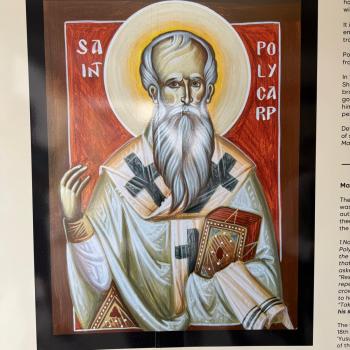BEN: One of the major points you make in dealing with the OT discussion about love, is that the caricature of the God of the OT being simply a God of wrath and the God of the NT being a God of love (going back at least to Marcion) is just that— a caricature, since God is portrayed as a God of love in the OT as well, and there is plenty of talk about God judging folk in the NT, indeed even Jesus being the final judge. Why do you think that the caricature still persists, even within the more conservative end of the church? Does it have something to do with God also being portrayed as a warrior and an advocate of holy war in the OT, but not so much in the NT?
PATRICK: I’m sure you’re right Ben. The imagery of God the warrior commanding what sounds to us like ethnic cleansing in the OT is powerful and troubling. It seems incompatible with the non-violent self-sacrificial mission of Jesus in the NT. Perhaps it is also due to a long tradition of distorted Christian interpretation that sees Judaism as a religion of works / law as opposed to the new covenant of faith / grace and liberty. I suspect that another reason the caricature persists is how in the NT love comes into sharper focus. An astonishing picture results: God’s love takes physical form in the utterly unlikely story of an incarnate Messiah who is God’s Son; human love for God responds to that immeasurable divine love; believers’ love for one another imitates that of Jesus and flows from the promised gift of God’s Spirit. This represents a remarkable development of how love is understood within the NT, but without care, it can all too easily be portrayed as discontinuous with the OT.
BEN: Early on in the book, you say that a contemporary portrait of love entails beliefs that love is unconditional and undemanding, it affirms the beloved just as they are and does not ask them to change, in other words it is non-judgmental, and that love is what life is all about (p. 5). What is wrong with this picture from a Biblical point of view?
PATRICK: That discussion is summarizing how the philosopher Simon May describes contemporary love in the West (his excellent book is called Love: A History). We tend to think ‘love’ has a universally understood meaning, but he shows how, when it comes to love, the past truly is another country and that our modern understanding of love is historically novel. It has become an article of faith, a religion if you like, in which true meaning, hope and transcendence is to be found. ‘God is love’ has become ‘Love is God’. If this analysis is accurate, and I think it is, then it becomes clear where modern love clashes with a biblical theology of love. It is naïve about sin, overly optimistic about the human heart, tends to assume love is easy and is the key to happiness. All this is relentlessly anthropocentric – a secular form of salvation.













